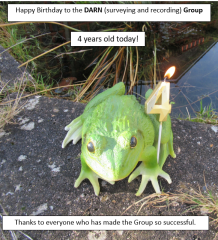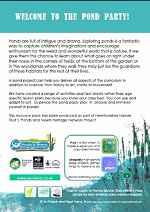About us
About Us
DARN is a network of people in Dorset interested in our native reptiles and amphibians. Its purpose is to promote the conservation, recording and appreciation of native amphibians and reptiles in the county of Dorset. DARN serves as a means of communication between volunteers, professionals and the general public. DARN members pay an annual fee of £6 and then when suitably trained they can take part in our widespread reptile surveys. These can be viewed once reptile surveyor status has been achieved. DARN is also running the SliC project - Slow-worms in Churchyards. We have rare reptile survey sites on FE and MOD land and we are continually adding new transects as we expand our activities across the county. DARN also monitors non-native species to try to assess any impact on our native species.
Dorset has 12 of the UK's 13 native amphibian and reptile species, and a handful of non-native species. Its internationally-important heathlands are famous as national strongholds for the rare reptiles - Sand Lizard and Smooth Snake - and southwest England's only populations of our second-rarest amphibian, the Natterjack Toad. With such an important wildlife heritage in Dorset, several wildlife NGOs have their headquarters in the county, including the Amphibian and Reptile Conservation Trust (ARC). Together with the various statutory bodies and local authorities, this means Dorset has many wildlife professionals. DARN aims to form a link between all these people, and to nurture an appreciation among the general public for our herpetofaunal friends.
Sheila Dyason is Chair of DARN. DARN Dispatches is a newsletter that is produced at least twice a year, telling you of news, items of interest, and projects to get involved in. Dorset is home to some of the most important reptile and amphibian populations in the country, with a high concentration of protected sites, conservation activities and research projects. There are endless opportunities for helping out by volunteering, and there are already many volunteers in the county who give their time towards projects helping to conserve our herpetofauna, and raise awareness.
The History of the DARN Group
DARN was set up as a surveying and recording group on 30/01/2020. Previously it had been an email and facebook group.
The founding members were Sheila Dyason as Chair, Catherine Dyason as Secretary, Pete Gillatt as Treasurer.
The Group started with rare reptile sites which Sheila had arranged with Forestry England to survey as part of HIWARG – the Hampshire Group. Some of them had been set up and monitored by David Tamarind who sadly died recently. There were not any widespread species surveys for members to get involved with so Sheila set up the SliC Project – Slow-worms in Churchyards - as a way to get members involved in surveying.
As of July 2021 DARN has 8 widespread reptile transects set up in north Dorset and three more rare reptile transects including one on MOD land. DARN is working with land owners and managers such as Forestry England, Butterfly Conservation, the Dorset Wildlife Trust, the MOD, church communities and private land owners.
News
News
DARN Dispatches 18
DARN Dispatches 18
Thanks to everyone who is currently carrying out reptile surveys for DARN. It is always exciting to lift a tile and see what is underneath.
Habitat management was a great success; although looking at the bracken that has been shooting up in the last few weeks it is hard to believe. At least the trees don’t regrow as fast.
Forestry England have appointed a Wildlife Ranger for North Hampshire but they are readvertising for the Ringwood area.
New water bodies have been created near and in Ringwood Forest. A steep sided gravel pit is attracting birds and dragonflies. A small strip of reptile fencing remains in place but as it is so short any reptiles can easily go around it. The site is fenced off with barbed wire and planted with hawthorn and blackthorn hedging. Hopefully once the vegetation gets established and the banks stabilise some access will be allowed. There is a small meadow strip between the pit and the forest track that is alive with insects at the moment.
A second site that is currently being created has a shallower edge. It is fenced off and there is a warning notice about quicksand at one end. Birds are already using it and once the vegetation grows it could be a good amphibian site.
One of the original ponds had 50 – 100 clumps of frog spawn this year. Hopefully the Frogs managed to develop before this section of the pond dried up.
We have just counted the reptile records for May 2025 that have been recorded by our surveyors during their monthly site visits:
104 Slow-worms
34 Common Lizards
17 Sand Lizards
9 Smooth Snakes
14 Adders
15 Grass Snakes
7 Wall Lizards
There will also be casual records and sightings by members of the public on Record Pool. So well done everyone!
As usual casual sightings of amphibians and reptiles can be added to Casual Sightings on the DARN website: www.groups.arguk.org/darn or on Record Pool: www.recordpool.org.uk. Historic records are fine as well.
We look forward to hearing from you.
Keep safe!
Sheila Dyason and Cathy Dyason
Chair of DARN Secretary of DARN
Conservation opportunities for everyone!
DARN Dispatches 17
* Habitat management has been progressing well – when the weather permits. Our tree work last year has made it quicker and easier to clear the bracken and regen. Thanks to everyone for their help.
* 24 Palmate Newts were seen in the Alderholt garden ponds (11/12/2024) one hour after sunset. All 4 ponds were occupied with 10 gathered in a group in the larger pond.
* Thanks especially to Cathy, Tina, Larry and Paul for your surveying efforts over the year. The 15 Smooth Snakes tally found by Paul was impressive.
* Frogs have been seen crossing roads on their way to their wintering sites.
* Wall Lizards are still being recorded on Bournemouth Cliffs (December).
* There are still some issues with ARGWEB but most are manageable.
As usual casual sightings of amphibians and reptiles can be added to Casual Sightings on the DARN website: www.groups.arguk.org/darn or on Record Pool: www.recordpool.org.uk. Historic records are fine as well.
We look forward to hearing from you.
Keep safe!
HAPPY CHRISTMAS to all our members
Sheila Dyason and Cathy Dyason
Chair of DARN Secretary of DARN
Conservation opportunities for everyone!
DARN Dispatches 16
DARN Dispatches 16
Thanks to everyone who has carried out reptile surveys over the spring and summer. It has been a hectic few months.
There are lots of juvenile reptiles and amphibians about at the moment. Gardening is difficult as the compost bin is full of Slow-worms; there are Grass Snakes under the hedge, tiny Frogs leap out when we try to weed a flower bed; Palmate Newts are in the soil and under rocks and tiles. The only ones missing are the Toads. No sign of them since breeding began.
Congratulations to Larry for being awarded his Natural England Rare Reptile licence. He has completed lots of surveys and added numerous records to the DARN and HIWARG databases over the last two years so it was well deserved.
Habitat management will be starting again in a few weeks. The bracken we cleared last year has regrown but not as tall as before and more sparsely which will make this year’s clearance a lot easier. The heather and gorse are looking beautiful and many walkers have commented on it.
We still have not heard if a new Forestry England Wildlife Range has been appointed but it does not affect our surveys or habitat management. It is just good to keep in touch.
As usual casual sightings of amphibians and reptiles can be added to Casual Sightings on the DARN website: www.groups.arguk.org/darn or on Record Pool: www.recordpool.org.uk. Historic records are fine as well.
We look forward to hearing from you.
Keep safe!
Sheila Dyason and Cathy Dyason
Chair of DARN Secretary of DARN
Conservation opportunities for everyone!
Happy 4th Birthday to the DARN Group

DARN Dispatches 15
DARN Dispatches 15
We are halfway through January already so a bit late to say ‘Happy New Year’. The weather has been fairly kind to Dorset so far. Mild and windy before Christmas but it did allow for plenty of habitat management opportunities. Bracken clearing has been the main focus at one site. Where the bracken has been left for a few years without management the heather is still fairly healthy underneath but where the bracken has not been managed for 6-8 years the ground is basically bare underneath once the dead bracken has been removed. Hopefully heather seeds have remained viable in the soil and will soon germinate. Habitat management is continuing but with the milder weather continuing we are also looking out for reptiles enjoying a bit of warmth in more sheltered areas.
Newts and Frogs are already arriving in ponds throughout the county and in our garden ponds. We have not heard of any Toad sightings yet. We wonder who will report the first spawn clumps of 2024.
Congratulations to Tina and Paul for being awarded their Natural England Rare Reptile licences. They have both completed lots of surveys and added numerous records to the DARN and HIWARG databases so they were well deserved. Two more DARN members are working towards their licences as well.
BBC’s Winterwatch starts tomorrow and is being broadcast from Arne so it will be interesting to see if the Team find any amphibians or reptiles on their wanderings.
As usual casual sightings of amphibians and reptiles can be added to Casual Sightings on the DARN website: www.groups.arguk.org/darn or on Record Pool: www.recordpool.org.uk. Historic records are fine as well.
We look forward to hearing from you.
Keep safe!
Sheila Dyason and Cathy Dyason
Chair of DARN Secretary of DARN
Conservation opportunities for everyone!
Join up or Log in
Join up or Log in
Info & ID guides
Info & ID guides
Herp Identification - downloadable colour charts
Amphibian Identification - downloadable colour cards
Reptile Identification - downloadable colour cards
Newt Eggs & Larvae - downloadable colour cards
![]() Its_a_small_newt_but_which_one_1.pdf
Its_a_small_newt_but_which_one_1.pdf
Dogs & Adders - downloadable advice sheet.
Improving Herp habitat
Creating Garden Ponds - downloadable booklet
ARGWEB Tutorials
![]() ARGWEB Pond Survey Recording Guide
ARGWEB Pond Survey Recording Guide
![]() ARGWEB Reptile Transect Survey Guide
ARGWEB Reptile Transect Survey Guide
Types of Sightings typically recorded on ARGWEB
How to record a transect survey data
Herp diseases - recognise & report
Snake Fungal Disease
Toad fly (Lucilia bufonivora)
Amphibian Chytridiomycosis
Ranavirus Disease
Reptile Slough Genebank - collection & submission of found sloughs
Other
Useful glossary of terms often used within the herpetological field. (Credit due - unknown)
Kids stuff - Educational items for the young ones
Pond pack 
Photo gallery
Photo Gallery
Upcoming Events
Upcoming events will be listed here.
Latest News
- DARN Dispatches 18
03/06/2025 7:43 pm - DARN Dispatches 17
12/12/2024 1:47 pm - DARN Dispatches 16
18/08/2024 7:19 pm - Happy 4th Birthday to the DARN Group
30/01/2024 7:50 pm - DARN Dispatches 15
15/01/2024 7:41 pm
© Dorset Amphibian and Reptile Network (DARN)
Website hits: 71821
View All | Find out how to get a mini-website for your ARG
© ARG UK Local Groups mini-websites 2026
Wind powered websites by Aye-aye Design.
